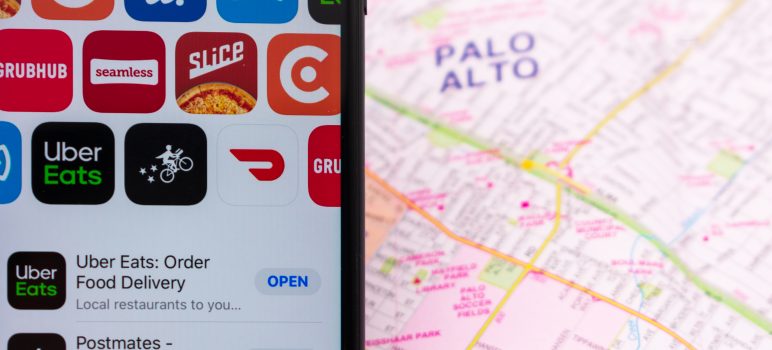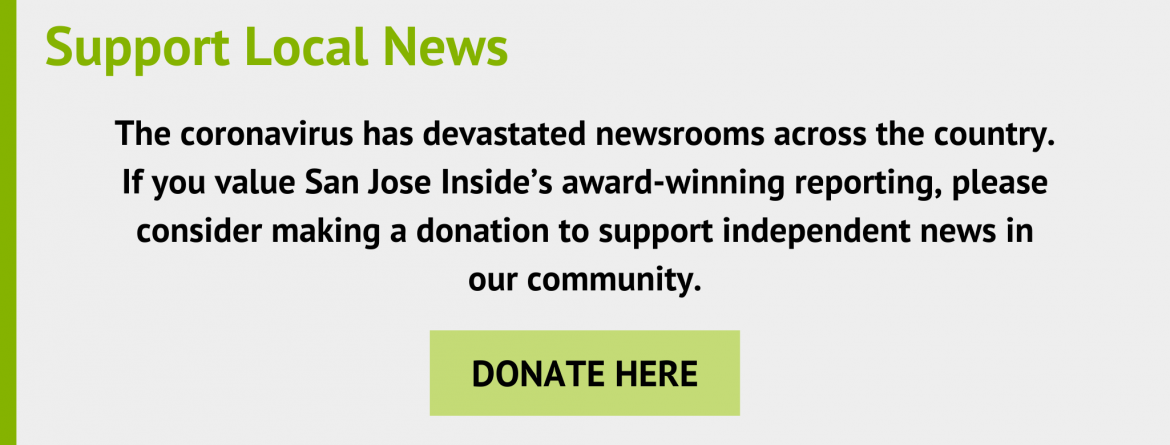A Slice of New York co-founder Kirk Vartan has his reasons for not using third-party delivery businesses like DoorDash, GrubHub and Uber Eats. Chief among them: that they simply take too big of a bite out of revenue.
So it goes without saying that Vartan is a huge supporter of a proposal laid out this week by San Jose leaders—following the lead of several cities in the Bay Area—to put a temporary cap on commissions and fees charged by app-based courier companies. With small business owners facing already thin profit margins, Vartan feels a capped fee is an absolute necessity for the thousands of food establishment owners who rely on them.
“I’m glad the city of San Jose and Santa Clara County are thinking about it and will most likely approve these measures,” Vartan said in a recent interview with San Jose Inside. “Companies like DoorDash, Uber Eats and Postmates, all these guys—and this is just my gut guessing—their profit numbers are pretty good. But the businesses they’re supporting are not doing that good. And every dollar percentage point a business can hang onto is like make or break for us right now.”
For financially hammered restaurants and small mom-and-pop eateries, the ordinance can’t come soon enough. Last Sunday those that had the capability were ordered to close the patios that had become a critical part of their business model while indoor dining was outlawed due to the pandemic.
Due to the latest stay-at-home order, food establishments in the county will be more reliant than ever on takeout and delivery services. Third-party delivery businesses charge up to 30 percent per order, and as much as a 15 percent commission for a customer pick-up ordered through the third-party online platform.
Mayor Sam Liccardo and Councilman Lan Diep’s measure—which passed 3-1 in Wednesday’s Rules and Open Government Committee and will now go before the City Council next week—caps third-party business fees at 18 percent, which would include delivery and all processing fees.
The proposal also protects drivers of third-party delivery services from a reduction of their wages and tips that might otherwise result from the capped fee being placed on these companies. Other Bay Area cities and counties have already passed similar fee cap measures, including Alameda and San Mateo counties and the cities of Milpitas, Santa Clara, Santa Cruz, Berkeley, Oakland and San Francisco.
David, who co-founded a successful food establishment two-and-a-half years ago in Santa Clara and asked to remain anonymous, said he was relieved when the City Council passed the temporary ordinance fee cap in September.
“These third-party delivery businesses sell a product, we buy a product and they want to make money—that’s fine,” David said. “But if I’m losing 20 to 35 percent right off the bat, am I going to increase my menu 25 percent on my customers? No. So at that point something has to happen or the business will be shut down completely.”
Out of necessity, David uses DoorDash and Uber Eats to get food delivered to his customers, but that doesn’t mean he trusts them. He said his experience with Uber Eats has been rather unpleasant and actually severed his relationship with DoorDash initially before negotiating a new percentage the company would take off his orders.
Before the temporary ordinance went into effect, David said DoorDash charged 20 percent per order, plus “a couple percent” for processing fees. “Even at that price, I had to negotiate down,” he said. “I told them either accept my conditions or there is no deal.”
Vartan did utilize third-party delivery businesses until severing ties permanently with them 18 months ago, citing a lack of professionalism.
“I’m OK to some degree sacrificing some level of profit to offer service to our customers because that value is an addition for sure,” Vartan said. “But if we’re going to sacrifice 10 to 15 percent of our profit margin—which isn’t big to begin with—and they’re fronting a charge to the customer, that’s a 40 to 45 percent swing extracted from the company and customer in some cases. Even at 10 percent—forget 15 or 30—it’s more than some businesses can afford even in good times.”
Nate LeBlanc, a business development manager with the San Jose Downtown Association, weighed in on the issue during Wednesday’s meeting. “My understanding is the average profit margin on a restaurant order is 8 percent,” he said, “so if there is a 30 percent fee on every order, it is not profitable for a business to even fill that order.”
In the future, Vartan envisions a cooperative delivery service that he said would bring more equity for drivers and businesses. “So it’s a holistic thing rather than a corporation extracting profits out of people,” he said, “which is happening now.”
Longtime restaurant owner Jennifer Echeverri said a fee cap is essential for survival, as she pays DoorDash up to $1,800 a week for their services.
“We need this fee cap to survive,” she said.
If the San Jose City Council approves the ordinance, the capped fee would last through next June, at which point it may choose to extend or suspend the fee based on the existing circumstances.



The government should consider price controls then on the amount pizza company owners are charging us for a pizza. Outrageous.
So counterproductive.
Delivery is your future, develop your own operation.
You are locking Uber Eats in, no other competitors will enter this market with price controls.
Worse service, worse treatment of workers, I guess you deserve it.
Vartan:
“ In the future, Vartan envisions a cooperative delivery service that he said would bring more equity for drivers and businesses. “So it’s a holistic thing rather than a corporation extracting profits out of people,” he said, “which is happening now.”
Hey kids, let’s all reimagine piazza delivery. If we had the SJPD do the delivery that would solve two problems, piazza inequity and police violence. When you are busy holistically, you don’t have time to profiteer or enforce any laws that someone might find offensive.
Glad to see that VArtan runs not for profit piazza joint. Finally, piazza equity.
If the current services where that profitable, new companies would start up and undercut their price.
> “ In the future, Vartan envisions a cooperative delivery service that he said would bring more equity for drivers and businesses. “So it’s a holistic thing rather than a corporation extracting profits out of people,” he said, “which is happening now.”
Vartan is really “thinking outside the box”.
Sounds like he is a fan of the Cuban/Venezuelan/North Korean pizza business model.
All places known for GREAT pizza, speedy delivery, and quality service.
Imagine how much better life would be if America had a national pizza industry.